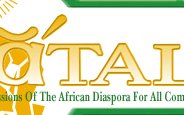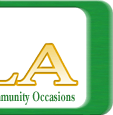| |
|
|
|
|
|
|
|
|
|
|
|
|
|
| |
|
||||||||||||
| |
|
|
|
|
|
||||||||
 |
 |
 |
 |
|
|
||||||||
| |
|
|
|
|
|
|
|
|
|
||||
| |
|
|
|||||||||||
| |
|
||||||||||||
Events:
"The Feast of Fire Festival" is sponsored by the Caribbean House (Casa del Caribe) and the Minister of Culture, along with the Cuban Institute of Friendship and the Writers' and Artists' Unions of Cuba. The Festival is multi-disciplinary and represents a "feast" of dance, music and folklore, art exhibitions, academic seminars, performances of typical musical groups, dialogues between poets, writers and oral narrators, cinema and video exhibitions, daily parades through the main streets and squares of the city, and performances by the diverse groups have been invited to attend. Academic and performing arts sessions are all held concurrently in a variety of locations throughout Santiago.
During the festival, Dromatala participated in six (6) artistic performances and various other dance and drumming exchanges. (Our exposure to other performances, lectures, and workshops was limited.) Each year the festival features a specific country, this year Panama was spotlighted. Along with Panama, other participating countries included: the Dominican Republic, Haiti, Mexico, Venezuela, Spain, Canada, Morocco, Hungary, Martinique, Argentina and Holland. Spectators of the festival included Cuban natives, individuals of all of the performing countries and on occasion, participants of the festival.
We performed at several "houses" ("Casa"), which appeared to be similar to what we in the United States would call "cultural centers". The performances were outdoors before large audiences. We performed with other festival participants and found these shows to be ideal for our work. The close proximity of the audience allowed for an exciting dynamic exchange between the artists and the audience, the audience was quite participatory as were other artists who responded with resounding appreciation to our presentations. We also performed in several proscenium-staged venues, two were very large, and one was a small opera house. The indoor performances included traditional lighting and sound equipment. These performances were also successful though not quite as well attended and in the future we would be more prepared to help the stage crews and festival organizers understand our technical requirements and our needs as the needs of a traditional West African ensemble are unique in a proscenium environment. The facilities were spatially adequate, each uniquely, though the variation of spaces is what created the acoustic limitations, among other things, mentioned above.
We had the opportunity to participate in an exchange with another folkloric group. Many of our members felt that this was a highlight of the trip. We were able to watch this group perform in an informal setting and vice versa, then we participated in a dance and drum exchange. This experience was an invaluable exchange of energy and kinesthetic information. In the future, we look forward to having more time devoted to these types of interactions so that we can share and learn specific rhythms and dances, and engage in networking. Connections that are made in this way can last for generations, as what we learn gets passed down in the generations of drummers and dancers within our communities and what we teach becomes a part of their traditions within their communities.
Dromatala participated in several dance and drumming exchanges with other participating companies. A couple of these exchanges were planned activities of the festival. One of our festival guides' who is also a director of a Cuban native company organized the paramount exchange of the festival. This exchange was the jewel of the trip for many of our group members as we spent the better part of three 3 hours singing and dancing with the group Cuba Oro. It seemed for that short time through the power of music and dance the language barrier was completely removed. Individuals in our group also found other exchange opportunities, which were often unplanned, informal exchanges that occurred between other participating companies and us. These informal exchanges happened in places like backstage, getting ready for the parade, and at the hotel before lunch.
Dromatala's participation in the Feast of Fire Festival ignited research and information gathering for preliminary documentation and the collection of interviews. This documentation will be used for the production of a documentary on the activities and norms of classical West African drum and dance genres in the United States. As a group we feel as if we have only scratched the surface in educational exchange opportunities found in Cuba. For many this has been a life altering experience that will continue to influence our work and commitment to the perpetuation of African diasporal Culture.
back to top
The Multi-Community Cultural Workshop Series
As modern day griots (the term given to the keepers of culture and history) we believe it is our duty to perpetuate the culture of our ancestors. Cuba was a primary gateway for the slave trade, it was the first place our ancestors were brought. As we trace back our history individually and collectively Cuba and the Feast of Fire Festival, is the logical beginning of that quest. Musically, this festival allows for dialogue, interaction, and collaboration of the participants, which can open up many wonderful possibilities.
The Center is founded on the tenants of understanding, education and tolerance. The festival has and will strengthen the griots of the Center by exposing its members to the diversity of the Diaspora. The Center offers the public access to the history and significance of Caribbean culture. Dromatala perpetuates the Center's tenants by traveling with lessons and traditions to institutions and communities around the nation during the Series. The Multi-Community Cultural Workshop Series features historically Black college campuses and penetrates the surrounding community in order to connect the campus with the community as a source for outreach and networking. Additionally, such networking and outreach is also important on non-Black campuses, therefore, the Series has also corresponded with any and all institutions that have expressed an interest and/or need. If we are to get along in our pluralistic society by respecting all racial and ethnic groups, participation in and education about the African Diaspora folkways is a beginning.
Calendar of Events
under construction
©
2002 Dromatala